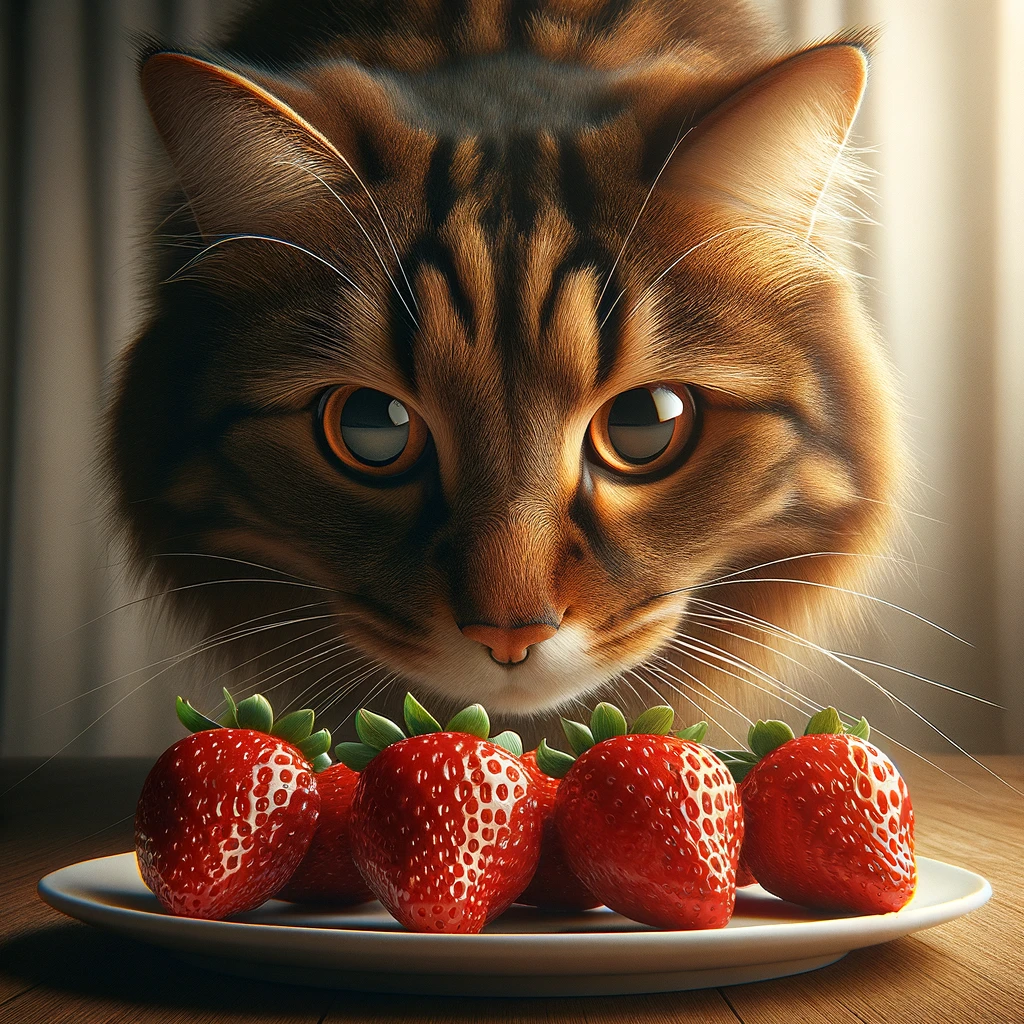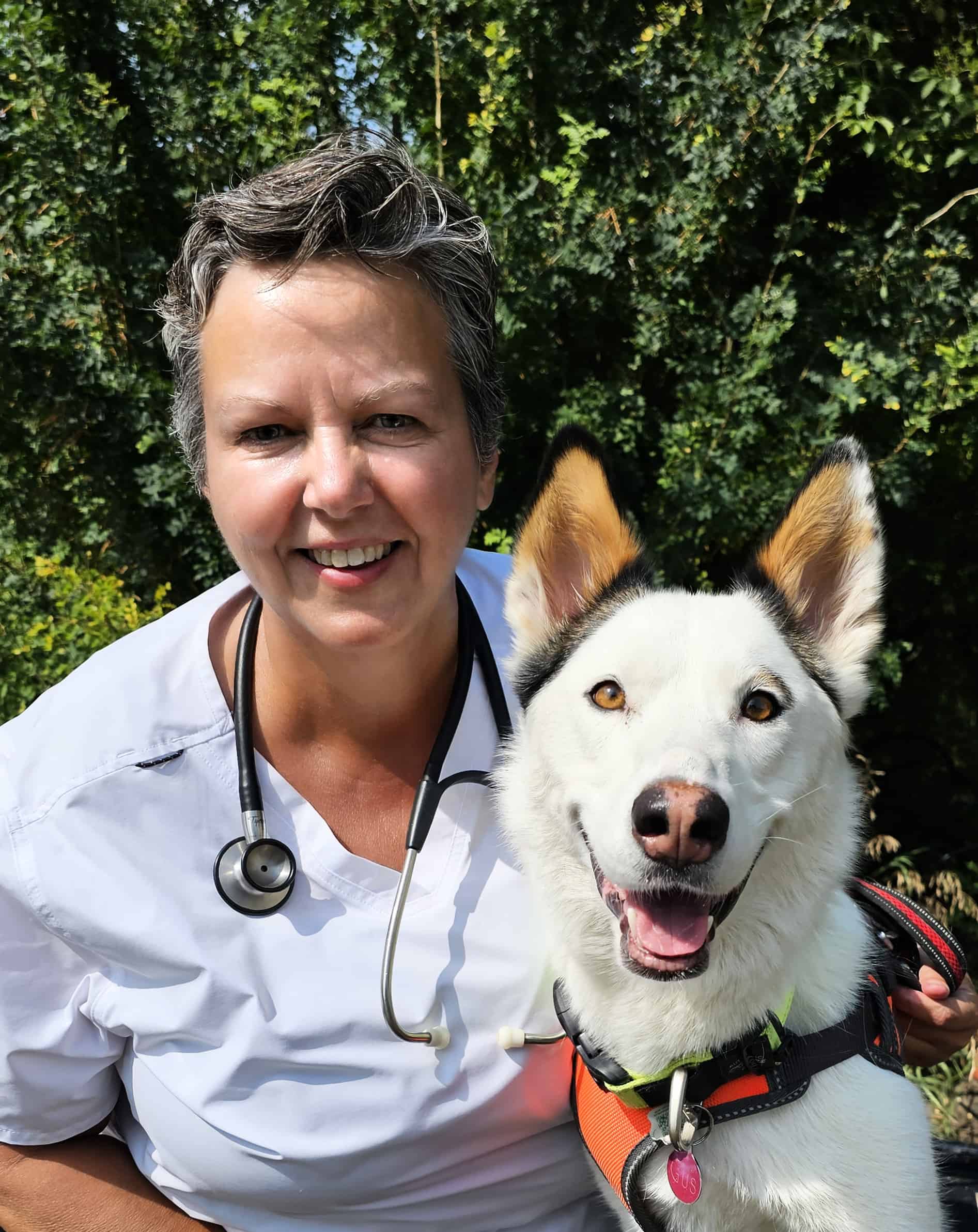We all know that cats can eat cat food. That is, most of us feed our cats cat food we buy from the store. But as all cat owners know, cats do what they want. And sometimes, what they want to do is eat foods that aren’t usually on their menu.
So can cats eat strawberries and other things that are strange (for a cat)? What about watermelon and bananas? Chocolate and peanut butter? Eggs or bread?
The good news is that cats can nibble on strawberries and many other “people” foods without harm, although there are a few things that you must be careful of. Chocolate, onions, and garlic are examples of food that absolutely should not be given to cats. Strawberries and most other fruit are fine in small amounts, but too much may cause gastrointestinal upset.
Read on to learn more about what a cat’s natural diet consists of as well answers to some of the more commonly asked questions about “what cats can eat”.
What Does A Cat Diet Normally Consist Of?
A cat’s natural diet is primarily composed of meat and is often referred to as an obligate carnivore diet. This means that cats are obligate carnivores, which means that they have specific nutritional requirements that are best met by consuming animal-based foods.
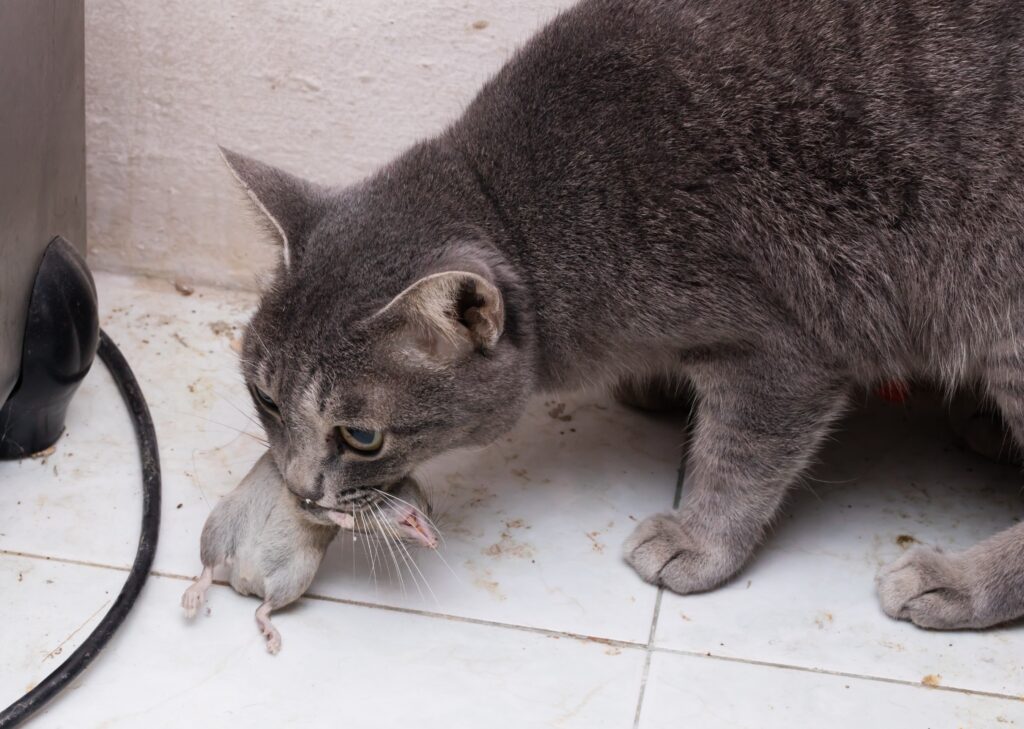
They have little capacity for digesting plant-based foods, which provide them with little nutritional benefits. Consuming large quantities of carbs can quickly result in abdominal pain, diarrhea, and other digestive upsets in cats.
Their dietary requirements include a high protein content, a dietary source of taurine (found in animal tissues), vitamin A, and arachidonic acid, and low carbohydrate content.
Because cats lack sweet taste receptors, sweet tasting foods like fruit are not normally attractive to cats. This means that fruit such as strawberries are not a usual part of a cat’s diet since cats are normally not even tempted to eat them.
However, some cats can still be attracted to the taste of strawberries and other “non-cat” foods. And when a cat wants something, it is difficult for cat parents to tell them “NO”!
But should you let them eat new foods that are not usually on their menu?
Can Cats Eat Strawberries?
Strawberries are known to have many nutritional health benefits, including being a good source of fiber, vitamin C, and antioxidants. However, because cats are obligate carnivores, they do not need to eat fruits to obtain the nutrients their body needs.
Still, cats can have strawberries – in small quantities. There is nothing toxic about strawberries that would harm your cat and, in fact, many cats enjoy the taste. So if your cat insists on eating strawberries, a little bit as an occasional treat isn’t going to hurt.
However, eating more than a couple of bites of strawberry could upset their digestive systems, so it is best not to let them have too much at one time.
Can Cats Have Allergic Reactions To Strawberries?
Theoretically, cats can have food allergies just like people do. Since allergies develop with repeated exposures, cats will not have an allergic reaction the first time that they eat strawberries. The chances of a cat eating strawberries more than once AND being allergic is very small.
A cat with a strawberry allergy may experience various symptoms, including upset stomach (vomiting, diarrhea), skin problems (itching, rashes), swelling of the face, breathing difficulties, tiredness, and excessive drooling.
These signs can vary in severity and may occur after a cat eats strawberries or other foods they are allergic to. If you notice these symptoms, consult a veterinarian immediately since severe allergies can be life-threatening.
The Best Way To Feed Cats Strawberries
To feed cats strawberries safely, wash the strawberries thoroughly to remove any pesticides or contaminants, and remove the stem or hull to prevent choking hazards.
Only offer small pieces of plain strawberries as an occasional treat, not a regular part of their diet, and avoid giving too much at one time. Do not feed strawberry jam or other strawberry sweets as the high sugar content is not healthy for the cat.
Watch your cat closely for any adverse effects such as gastrointestinal upset, itching, or other unusual behavior. If any issues arise, discontinue feeding strawberries.
Other Things That Cats Can Safely Eat
Can Cats Eat Watermelon?
Yes, cats can eat watermelon as long as it is seedless and cut into bite-sized pieces. The same goes for other melons, such as cantaloupe and honeydew. Because it has a high sugar content it should not be given to diabetic cats or those that are obese. Avoid giving them rinds, since these can pose a choking hazard or cause intestinal obstruction.
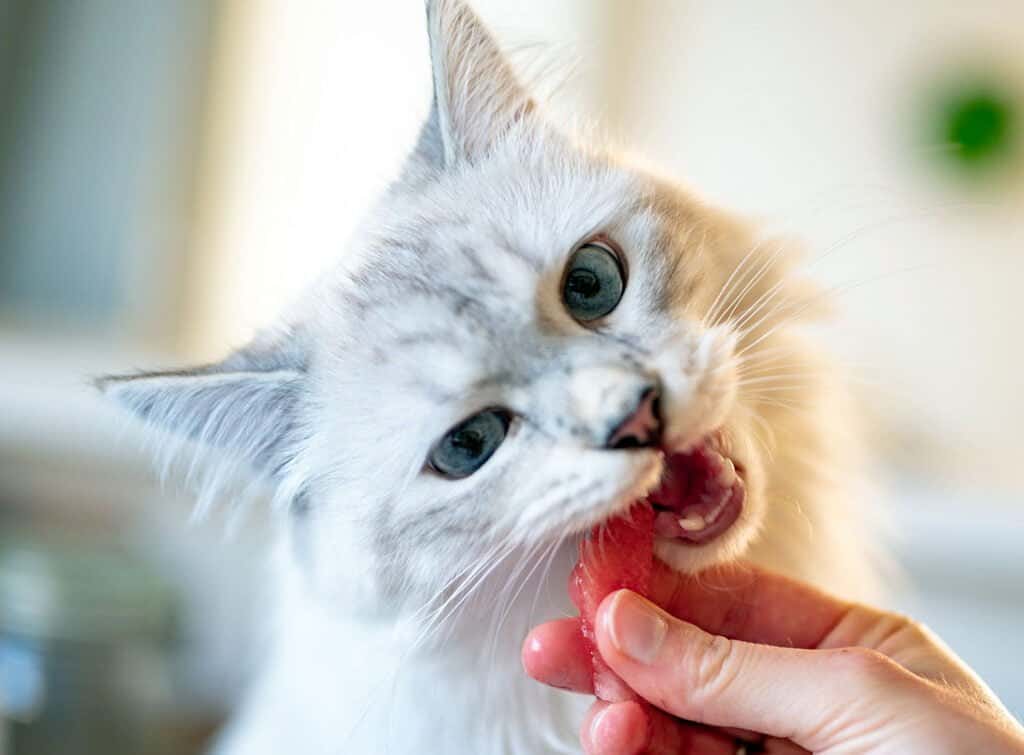
Can Cats Eat Bananas?
Bananas can be a safe treat for cats. As with any human food you give your cat, bananas should only ever be offered in small amounts as an occasional snack. Feeding too much banana can lead to digestive issues such as diarrhea.
Can Cats Eat Eggs?
Cats can eat eggs in small amounts and as part of a balanced diet.. Eggs are an excellent source of animal protein and contain a wide range of nutrients beneficial to cats such as vitamins B12, A, D, and E. Never give them raw eggs due to the risk of salmonella in uncooked eggs.
Can Cats Eat Bread?
Cats can have bread in moderation. Since cats are strict carnivores (their natural diet consists of meat only) and they have limited ability to digest these carbohydrates, bread provides little nutritional value for cats and can upset their digestive system if they eat too much. .
Avoid giving your cat bread with any additional ingredients such as garlic, onions, and spices, as these can be harmful to cats. Onions, garlic, chives, and leeks are poisonous to both dogs and cats in the right amount, with garlic being the most toxic.
Foods A Cat Should Not – Or Must Not! – Eat
As mentioned earlier, cats are obligate carnivores and have specific nutritional requirements that must be met by consuming animal-based foods. There are also some other human foods that should never be given to cats, including:
- Chocolate: Theobromine is the toxic component of chocolate for both dogs and cats.
- Onions and Garlic: As mentioned above these two ingredients can be harmful.
- Grapes and Raisins: Even small amounts of these fruits can cause kidney damage in cats.
- Alcohol: Cats should never have any alcohol as it can cause serious health problems, including liver and brain damage.
Some other foods that require caution include:
Peanut Butter: Technically, cats can eat peanut butter although they derive little nutritional value from it. The problem is that some brands contain the artificial sweetener xylitol, which is known to be poisonous to dogs. Although cats do not seem to be sensitive to small amounts of xylitol, the science on its safety for cats is still not conclusive and it is best to avoid feeding your cat peanut butter altogether.
Dairy Products: Cheese, milk, and cream contain lactose. Adult cats, in general, are lactose intolerant because their body makes little or no lactase, an enzyme that breaks down the sugar in dairy products.
Too much dairy can cause diarrhea, vomiting, and other digestive issues in cats. So it is best to avoid giving your cat cheese and other dairy products.
If your cat is very insistent about having its milk, make sure to treat them to small amounts of lactose-free milk only. Avoid giving cream, since its high fat content is not good for your cat’s tummy or waistline.
Citrus Fruits: Citrus fruits such as oranges, lemons, and grapefruits should be avoided. The stems, leaves and peel are highly toxic to cats, and the citric acid in the fruits can cause gastrointestinal upset and is possibly toxic to cats.
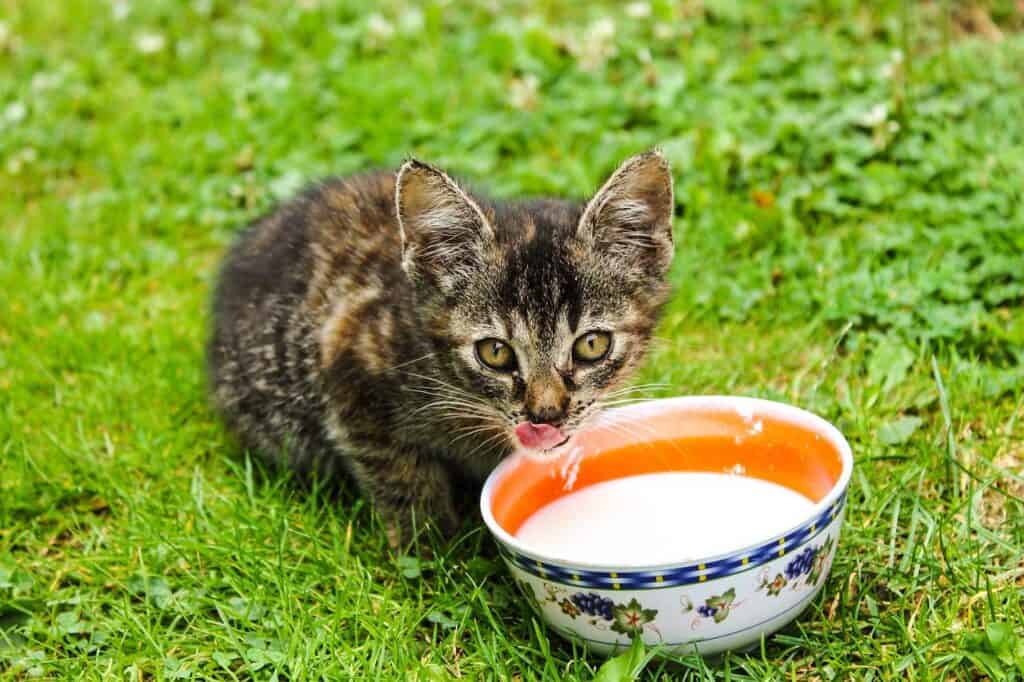
Conclusion
While cats can indeed eat strawberries, cats are obligate carnivores and as such, their diets should mainly consist of a regular cat food that has been formulated to meet all the cat’s needs.
Cat treats that can be fed from time to time include cooked chicken, fish, and other meats, as well as small amounts of certain fruits and vegetables.
Avoid any foods which are potentially toxic to cats, such as chocolate, garlic, and onions, and avoid giving large amounts of any food high in carbohydrates or those with too much sugar.
These types of food do not provide the nutrition that cats need and, as most of their owners know – too many snacks are hard on the waistline, and the same applies to cats.
Remember, always consult your veterinarian if you have any questions or concerns about your cat’s diet and health. They are the best source of information and guidance on what is safe and nutritious for your feline friend. Happy snacking!
Note: Want to know something else cats shouldn’t eat? Lizards! Find out why here.
Disclaimer: This article is intended for information purposes only, and does not constitute medical advice. Always consult your veterinarian if you have specific concerns about your pet’s health.
Sources:
https://www.ncbi.nlm.nih.gov/pmc/articles/PMC2063449/
https://www.nasc.cc/pet-university/vitamin-deficiency-cats/
https://www.ncbi.nlm.nih.gov/pmc/articles/PMC4473166/
https://www.ncbi.nlm.nih.gov/pmc/articles/PMC5753635
https://www.merckvetmanual.com/toxicology/food-hazards/xylitol-toxicosis-in-dogs

